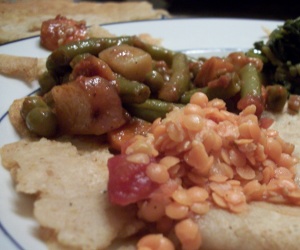One of my favorite Twin Cities events is the annual Rain Taxi book fest. I walk into the building where it’s held, and a feeling of peace and happiness comes over me. “These are my people,” I think to myself, surrounded by writers and readers. All day there are exhibits by local publishers, writers, bookshops and other book-related but the real draws are the children’s pavilion, where authors read and sign all day for an all-ages audience, and my favorite, the panels throughout the day with well-known authors. This year I went to see James Howard Kunstler and M.T. Anderson, both of whose books have been recommended by fellow bookish blogger Mental Multivitamin.
Kunstler is the author of the non-fiction The Long Emergency, about the over-reliance on cheap fuel, and the wishful thinking that will get us into trouble. He’s written two novels, World Made by Hand and The Witch of Hebron (long “e” in Hebron, as they pronounce it in NY and OH), based on what life might be like in the aftermath of a fuel breakdown.
In person, Kunstler is energetic, funny, and doesn’t sugarcoat anything, as when he said each time he visits the Twin Cities the downtown gets worse and worse. He railed against what he called “the incapacity to construct a coherent narrative between what’s happening to us and what we’re going to do about it.” He sums up “what’s happening” as a threefold crisis: financial, energy and climate. He says these three are struggling for primacy, and currently the financial crisis is “winning” by getting the most attention. He noted that distress and delusion rise together, and a symptom of them is something he calls “techno-grandiosity,” especially interesting because many of the other Book Fest panels were on technology and its relation to reading, writing and publishing. Along these lines, he warned we’ll be disappointed by alternative energy sources when we don’t have cheap global fuel to fall back on. We’ll need to make radically different choices, and not just assume that solar and wind power can pick up where cheap oil leaves off. In the US, he says this means we need a viable rail system as a true alternative to motoring and aviation. Building the rail system is what he called an intelligent response, rather than just wishful thinking.
He talked about why he wrote World Made by Hand, and addressed the most frequent criticism he receives, about its unvalorous women characters. “Social situations are going to change when financial things change,” he said, noting that women gained ground in the gender wars on the corporate battlefield, in wages, jobs and status. When corporations no longer exist, he says, struggles over gender will change.
Kunstler said he also heard from many who disliked the supernatural element to the books, especially given his no-nonsense attitude to science and uncomfortable facts about where the world is headed. In the novel, the city dwellers still have remnants of enlightenment, so aren’t superstitious. This clashes with the worldview of the religious, who aren’t “burdened” by beliefs in science and technology, like the character of Brother Job, who he described as a cross between Boss Hogg and Captain Ahab.
An audience member asked what Kunstler had against bikes and bikers. The author laughed and said for him, writing a novel was an emergent self-organizing process. He realized as he wrote that after a global breakdown, things like rubber and substitutes, as well as specialized metal for sturdy bike frames, wouldn’t be readily available. Further, biking depends a lot on paved roads, which would break when they were no longer used and maintained. Instead, people would choose more reliable off-road transportation options, like horses.
While he railed at many examples of what he called “simpleton views,” he did actually offer some advice: move to smaller towns and cities like Kalamazoo, Duluth or Grand Rapids, or somewhere that has a meaningful relationship with food production.
M.T. Anderson, author of the National Book Award winner The Astonishing Life of Octavian Nothing, was an interesting contrast to Kunstler’s “we’re all doomed, but some of us are gonna be better prepared than others” take on things. Anderson got wide recognition with his satiric novel of the future, Feed, published in 2002. In it, most U.S. citizens are connected to the feed of the title, which is a chip implant in your head of a 24/7 internet. The main character, Titus, is a “distracted idiot” said Anderson. I re-read Feed last week, and was surprised and impressed at how well it had aged. In response to an audience question, Anderson said the one big thing he’d failed to guess and that had surprised him was the weird element of aggressive self promotion that has grown from websites to weblogs to the current age of Facebook.
During the Q and A, he was asked what bedtime story he remembered reading. He said he couldn’t recall, but he did remember his father singing him a song at bedtime about Anne Boleyn. He then burst into song, hesitating over some of the lyrics, but some audience members helped out to carry it through. It was a nice way to end the session.
In Feed, Anderson chose to satirize how we’re all going to hell, technologically and ethically. I don’t think he and Kunstler would disagree, but the latter goes beyond satirizing the present, to wondering what the heck happens after that. Seeing both authors, and hearing them speak, made me very interested in reading their current books, and I’ll keep an eye on what comes next from each of them.


